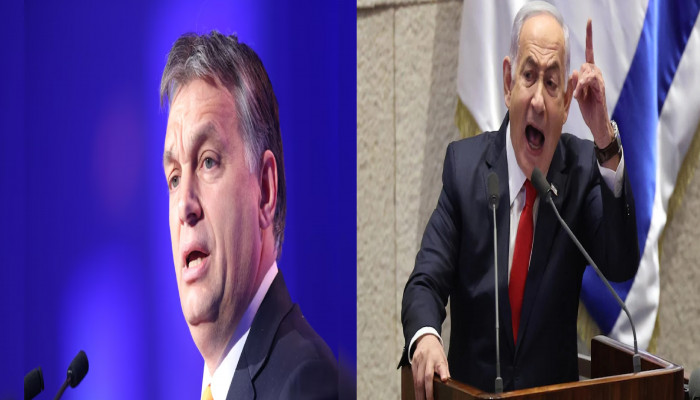Orban defies ICC arrest warrant for Netanyahu, Italy and Netherlands pledge to comply
- In Reports
- 05:55 PM, Nov 22, 2024
- Myind Staff
Hungarian Prime Minister Viktor Orban has criticised the International Criminal Court (ICC) for issuing an arrest warrant for Israeli Prime Minister Benjamin Netanyahu. Orban announced on state radio that he plans to ignore the court's decision and will invite Netanyahu to visit Hungary. This was reported by Reuters on Friday.
Orban claimed in the program that the arrest order violates international law and heightens tensions in the ongoing crisis in Gaza, accusing the ICC of politically motivated meddling. Orban called the court's conduct "cynical" and "outrageously impudent." The International Criminal Court (ICC), based in The Hague, issued arrest warrants on Thursday for Israeli Prime Minister Benjamin Netanyahu, former Israeli Defense Minister Yoav Gallant and Hamas military leader Mohammed Diab Ibrahim Al-Masri.
They have been charged by the court with crimes against humanity in connection with the 13-month conflict in Gaza. Netanyahu and Gallant are accused of limiting humanitarian aid and attacking civilians during military operations in order to use famine as a weapon of mass destruction. These accusations have been refuted by Israeli officials. Hungary's Prime Minister, Viktor Orban, invited the Israeli Prime Minister to Hungary. Even though Hungary is a member of the International Criminal Court (ICC) and is required by law to arrest individuals with ICC warrants, Hungary has said it will not follow this obligation.
Orban added that the ICC's warrant would not affect his intentions to welcome the Israeli leader to Hungary. "We will defy this decision, and it will have no consequences for him," Orban stated. Peter Szijjarto, the foreign minister of Hungary, criticised the ICC's action as "absurd."
Meanwhile, European countries have promised to arrest Benjamin Netanyahu and Yoav Gallant after the International Criminal Court (ICC) issued arrest warrants for the two Israeli leaders. The ICC accused them of committing crimes against humanity and war crimes for their actions during Israel's war with Hamas in Gaza. The ICC's decision to issue arrest warrants means that the two Israeli politicians could be arrested in any of the 124 countries that have agreed to the court's rules. While the ICC can't directly enforce the warrants, any country that has signed the Rome Statute would be required to arrest Mr. Netanyahu or Mr. Gallant if they enter that country.
On Thursday, several countries, including the Netherlands and Italy, declared that Mr. Gallant and Mr. Netanyahu would be imprisoned if they stepped on their territories. "We would have to arrest them," Italian Defense Minister Guido Crosetto said on RAI television. He said that Italy's decision was not based on politics, but because, as a member of the ICC, Italy is obligated to follow the court's orders. The Netherlands also stated it would follow the arrest warrants. This came after the European Union urged its member states to respect and comply with the ICC's arrest warrants. Josep Borrell, the EU's foreign policy chief, disagreed with Israel's claim that the ICC's decision was politically motivated.
“It is not a political decision. It is a decision of a court, of a court of justice, of an international court of justice. And the decision of the court has to be respected and implemented,” Mr Borrell said, adding that the court’s decision is binding on all EU member states. Support for the ICC ruling was voiced by several European nations. Simon Harris, Ireland’s prime minister, called the decision an “extremely significant step. These charges could not be more serious”. “Ireland respects the role of the International Criminal Court. Anyone in a position to assist it in carrying out its vital work must now do so with urgency,” added Mr Harris. However, the French foreign ministry refrained from declaring that Mr. Gallant and Mr. Netanyahu would be imprisoned if they entered France.
“It’s a point that is legally complex so I’m not going to comment on it today,” a spokesman said. Justin Trudeau, the Prime Minister of Canada, stated that his government will follow all the rules and decisions of the International Criminal Court. He said: “It’s really important that everyone abides by international law. We stand up for international law, and we will abide by all the regulations and rulings of the international courts.” Jordan's foreign minister, Ayman Safadi, added that member states must abide by the ICC's decision.







Comments